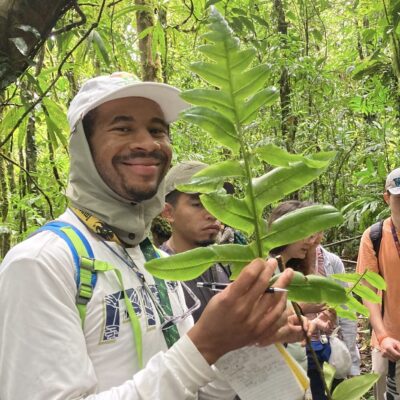Student Spotlight: Josh Felton

December 11, 2023
Joshua Felton is a doctoral student in plant biology from Minneapolis, Minnesota. He earned his B.A. in organismal biology and ecology from Colorado College and now studies the rapid species diversification of pineapples under the guidance of Chelsea Specht at Cornell.
What is your area of research and why is it important?
Systematics, the study of the diversity and evolutionary relationships of living forms, is particularly crucial today. As we witness a rapid loss of biodiversity daily, understanding the relationships among living things becomes paramount for conservation efforts. I plan to use phylogenies (a way to visualize the evolutionary relationship between groups) to understand how floral and fruit traits have been shaped in the pineapple family through its rapid species diversification throughout the Neotropics.
What are the larger implications of this research?
My research in understanding the evolutionary relationships within the pineapple family holds larger implications that extend beyond learning about species for the realms of academia. As we navigate an era of accelerating climate change and biodiversity loss, by identifying key adaptive traits and understanding the selective pressures, we can prioritize the preservation of species crucial for maintaining ecological balance.
As a science communicator, I recognize the significance of translating complex phylogenetic concepts, often referred to as “tree thinking,” to the general public. I aim to dispel these misconceptions and highlight the equal evolutionary standing of all extant species, whether they be plants, microbes, fungi, or animals. This is crucial not only for fostering a deeper appreciation of biodiversity but also essential for developing holistic conservation strategies that encompass the entire spectrum of life on Earth.
What does it mean to you to be a Dean’s Scholar?
To me, being a Dean’s Scholar signifies not only a recognition of my academic achievements but also an acknowledgment to actively engage within the academic community at Cornell and community in Ithaca as well as the surrounding Finger Lakes.
What are you most looking forward to in regards to being a Dean’s Scholar?
Being selected as a Dean’s Scholar is a tremendous honor and a responsibility that I am eager to embrace. After attending the pinning ceremony and listening to the experiences shared by senior Dean’s Scholars at Cornell, I am excited to fill those same shoes as a role model and near-peer mentor to other, more junior Dean’s Scholars as I progress throughout my Ph.D., making mistakes, and thus learning about myself and the world to then pass along my knowledge to future generations of scholars.
President Pollack has designated this academic year’s theme as freedom of expression. What does freedom of expression mean to you?
In the various social circles and academic settings I’ve experienced, there tends to be a recurring echo chamber of ideas. Freedom of expression, in my view, involves participating in conversations across diverse social circles with varying ideologies. The aim is not necessarily to debate, but rather to listen and broaden one’s own understanding. This process enables individuals to express their thoughts more coherently and expressively—whether in a classroom, at a cafe, or while chatting with a stranger on the subway. The ultimate goal is to contribute to the development of a vibrant and informed society that values and listens to all voices.
What are your hobbies or interests outside of your research or scholarship?
I enjoy playing the guitar and recently delving into the realm of synthesizers, particularly the endless options to modulate sine waves. Playing musical instruments serves as a grounding force for me, offering a welcome respite after a long day of class and lab work. Beyond music, I have a passion for coffee and craft beer. If you ask me about the specific beans I’m brewing with or my current favorite hazy beer, be prepared to open a delightful can of worms!
Why did you choose Cornell to pursue your degree?
I chose Cornell primarily due to its rich history and prominence in the field of plant sciences. In my exploration of various schools and labs, what set Cornell apart was the robust presence of esteemed botanists and the unparalleled opportunities for interdisciplinary research across SIPS. Moreover, the exceptional faculty that I could have as mentors such as Dr. Specht played a pivotal role in my decision to undertake my doctoral studies at Cornell.
